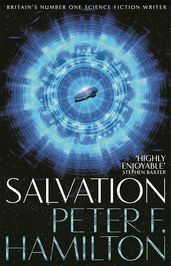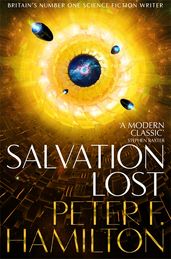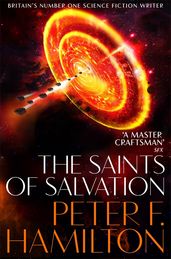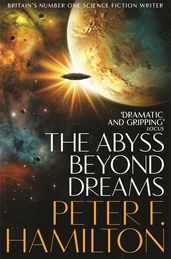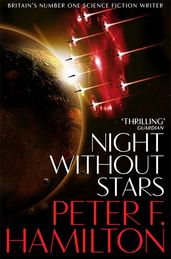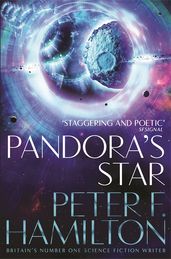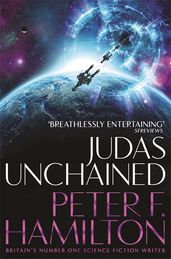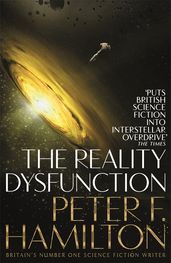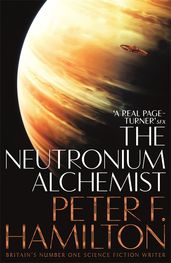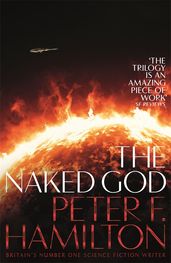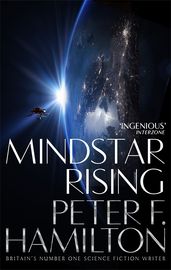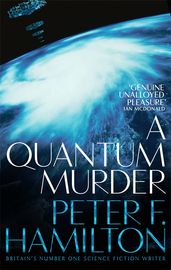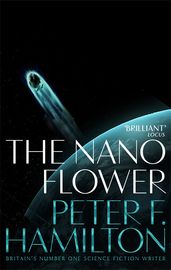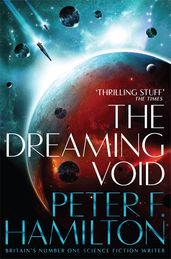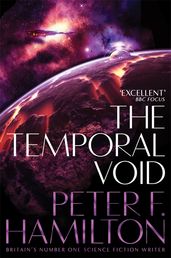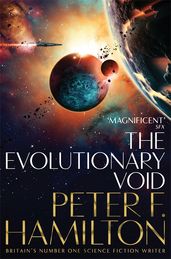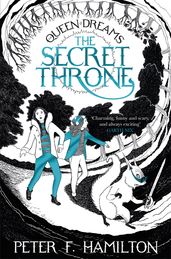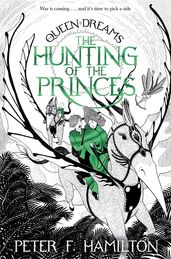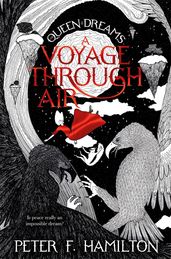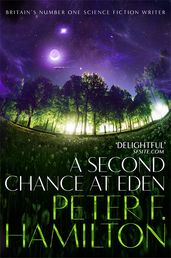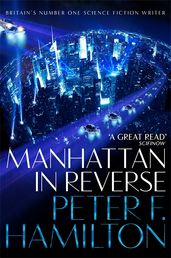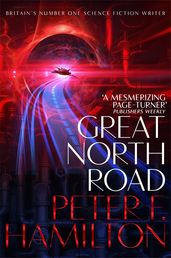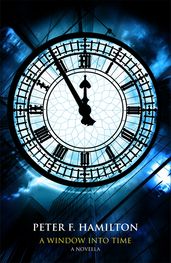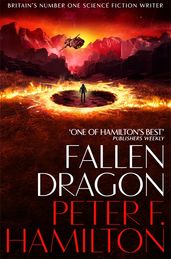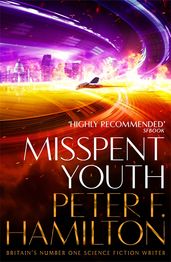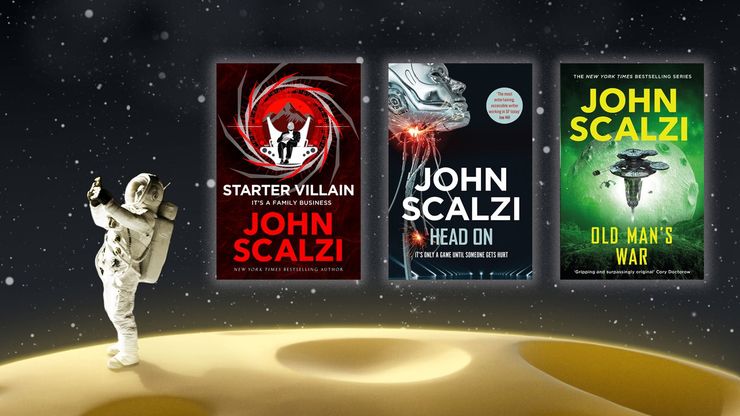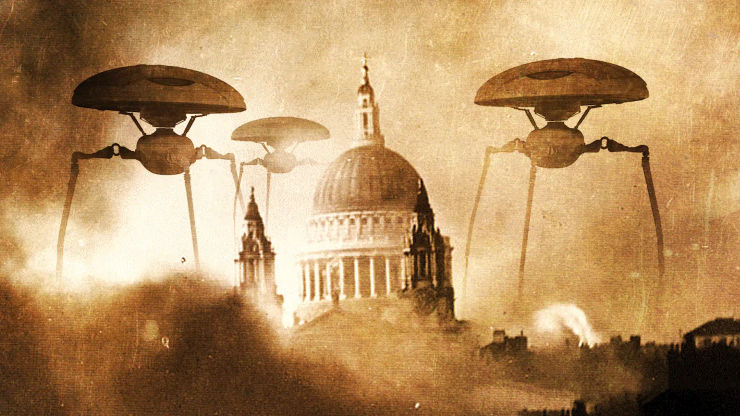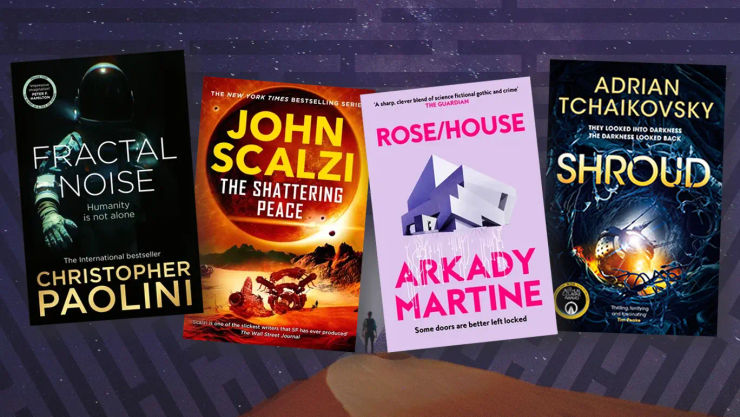Peter F. Hamilton’s books in order
All of sci-fi author Peter F. Hamilton’s books in order.

From gripping space operas that contemplate the end of human existence to incredible short stories imagining the future of technology, Peter F. Hamilton writes captivating science fiction books that fans of the genre shouldn’t miss.
Here, journalist David Barnett takes a look at Peter’s career so far, including his most recent work Exodus: The Archimedes Engine. Whether you’re new to Peter’s work, or a long-time fan here are all of Peter F. Hamilton’s books in order.
What is Peter F. Hamilton's new book?
Published on 19 September 2024, Exodus: The Archimedes Engine is Peter F. Hamilton's latest book.
Exodus: The Archimedes Engine
by Peter F. Hamilton
Explore the universe of Exodus, a new sci-fi action-adventure RPG by Peter F. Hamilton. Centuries after humanity fled Earth in search of a new home, they discovered the Centauri star cluster, teeming with habitable planets. Now, the descendants of the first settlers, known as Celestials, rule vast star systems with an iron grip. As new ark ships continue to arrive, Finn, a Centauri-born human, dreams of freedom. When a long-lost ark ship reappears, Finn seizes the chance to become a Traveler, exploring the unknown reaches of space in search of a better future. Exodus: The Archimedes Engine is the first book in a duology, offering fans of Hamilton’s richly-imagined worlds a deep dive into the epic Exodus universe.
The Salvation Sequence books
An alien conspiracy threatens to unravel all of humanity, and a group of far future soldiers may be our only hope.
Salvation
by Peter F. Hamilton
AD 2204: a mysterious shipwreck appears on a planet at the edge of the galaxy. Its cargo is troubling, so a team led by Security Director Feriton Kayne is sent to investigate. But what they discover raises bewildering questions – and could predict humanity’s demise.
In the far future, a group of genetically engineered humans are training for war. Their ancient enemy scattered human civilization across the galaxy. And if they aren’t stopped, it could mean the end of mankind.
Salvation Lost
by Peter F. Hamilton
In the twenty-third century, humanity thrives in a comparative utopia. But that is about to change. Feriton Kayne’s investigative team has discovered a terrifying alien conspiracy that could obliterate mankind. The Olyix plan to harvest humanity and carry us to their god at the edge of the universe – no matter the cost.
Now humanity stands at a crossroads. While some push to flee for the stars, others are determined to make a heroic last stand. Even if it means fighting for a future this generation will never see.
The Saints of Salvation
by Peter F. Hamilton
The Olyix have laid siege to Earth, harvesting people for their god. Cities are falling to their devastating weaponry and millions have either fled to seek refuge in space or are fighting a war that seems unwinnable. As Earth's defeat draws ever closer, a team are sent to infiltrate the Olyix's arkship. Their plan? To signal its location to future generations and bring the battle to the enemy . . .
Commonwealth: Chronicle of the Fallers books
A desperate war between Bienvenido, a remote human colony, and the predatory Fallers forces humanity to the brink in this explosive duology.
The Abyss Beyond Dreams
by Peter F. Hamilton
The year is 3326. Nigel Sheldon, founder of the Commonwealth civilization, sets off to investigate a mysterious and deadly area of space known as the Void. But when he crash-lands on an unknown planet, he discovers that it’s already inhabited – by the descendants of long-vanished Commonwealth ships.
Since then, the descendants have been fighting a desperate battle against the alien Fallers, who annihilate every species they encounter with brutal efficiency. But the Fallers could also be the key to the destruction of the Void itself – if it’s not already too late.
Night Without Stars
by Peter F. Hamilton
The planet Bienvenido has finally escaped the Void. But its citizens are still desperately struggling against the genocidal Fallers, who have infiltrated every level of human society in their quest to destroy mankind. Nowhere is safe – and no one can be trusted.
From the ashes of warfare, a mysterious hero known as the Warrior Angel leads the resistance. And as she faces insurmountable odds, astronaut Ry Evine uncovers one last hope. An unidentified vessel crashes on the planet carrying knowledge that could save them all . . . unless the Fallers get there first.
The Commonwealth Saga books
The discovery of an immense alien power at the edge of the universe upheaves humanity’s fragile peace, and forces them to fight for their survival as never before.
Pandora's Star
by Peter F. Hamilton
Earth 2329: Humanity has spread across the galaxy, colonising hundreds of planets linked by wormholes. Finally, there is peace. But when stars thousands of light years away start to vanish, ex-NASA astronaut Wilson Kime is sent to discover the cause.
Travelling in his faster-than-light spaceship, Kime arrives to find the stars imprisoned in an immense force-field. Entire star systems are sealed off. But who could possess this technology? And were they trying to keep us out . . . or keep something else in?
Judas Unchained
by Peter F. Hamilton
Thousands of light-years away, a terrible mistake was made and humans awoke an unstoppable alien force. The remnants of the Commonwealth strive to overcome it, even as an unknown player continues to pull hidden strings and manipulate the outcome. So Chief Investigator Paula Myo is tasked to hunt down this mysterious enemy, in the hopes of discovering the war’s true orchestrator.
Caught between two deadly adversaries, the Commonwealth must stand together if it is to outlive this monstrous war. This will be humanity’s finest moment – or its last hour.
Night’s Dawn trilogy books
On a remote planet, an unimaginable horror awakes, jeopardising humanity as it sweeps through the galaxy with deadly consequences.
The Reality Dysfunction
by Peter F. Hamilton
In AD 2600, mankind can finally see the glimmer of peace. Diverse cultures thrive on colonised planets, while genetic engineering extends our lifespans and eradicates disease. Throughout the galaxy, the Confederation Navy keeps the trade links safe.
But on a primitive colony planet, disaster strikes. A chance encounter between a renegade criminal and an alien entity unleashes a formidable terror. It is called the Reality Dysfunction, and it is a nightmare that has prowled beside us since the dawn of time.
The Neutronium Alchemist
by Peter F. Hamilton
The horrors of the Reality Dysfunction have swept through humanity, with staggering consequences. Those who succumb acquire godlike powers, advancing across the galaxy to leave chaos in their wake. And as entire worlds fracture and collapse, the Confederation Navy struggles to maintain order.
Under the shadow of this revived ancient terror, a powerful new weapon could cause further complications. Dr Alkad Mzu is determined to wield it and complete her mission to slay a star. But others may have their own ideas . . .
The Naked God
by Peter F. Hamilton
Earth’s defences have fallen, its cities destroyed. And the Confederation Navy, protectors of the galaxy, are on the verge of collapse, unable to stop the enemy. As time runs out, those who fight on must forge new alliances – though an enemy’s enemy isn’t always a friend.
While war rages, rumours surface of an ancient space-faring race who faced this same threat and survived – thanks to a mysterious entity called the Sleeping God. Now Joshua Clavert and Syrinx set off on a mission to find it, in the hopes of averting the ultimate catastrophe.
The Greg Mandel trilogy books
Private eye Greg Mandel is thrust into the world of corporate espionage and murder, as he tracks cases through a climate change-ravaged Earth.
Mindstar Rising
by Peter F. Hamilton
In the near future, life on Earth is irrevocably changed. Climate change has decimated the planet, now dominated by powerful corporations. In this world, a man open to any offers – a man like Greg Mandel – can do just fine.
Wired into high-tech sensory equipment, he’s the perfect person to intervene in the newest conflict. Corporation Event Horizon is about to roll out a revolutionary new power source, which could solve the world’s energy crisis. But someone is sabotaging their stock – and it’s up to Greg Mandel to find out why.
A Quantum Murder
by Peter F. Hamilton
Greg Mandel has officially retired from the private eye life. But then Edward Kitchener, a brilliant quantum cosmology researcher, is brutally murdered. And his employers are desperate to know what happened.
Enticed out of retirement, Greg Mandel launches himself into the investigation. But difficult questions abound. Was Kitchener a victim of corporate espionage, or something more sinister? And the trail will lead Greg Mandel to an astonishing confrontation with a past – that according to Kitchener’s theories, might never have existed.
The Nano Flower
by Peter F. Hamilton
Julia Evans is the billionaire owner of powerful company Event Horizon. And she’s in trouble.
Her husband has vanished, and now rival corporations claim to possess a technology superior to anything on Earth. So she doesn’t notice an anonymously delivered flower. But this flower contains advanced genes, millions of years beyond terrestrial DNA. A cryptic alien message – or a farewell from her husband?
Enter Greg Mandel, psi-boosted private eye. But he’s not alone in the hunt for its origins. And his efforts might not be enough – when the flower starts to bloom . . .
The Void trilogy books
A siren song prophecy depicting paradise compels an obsessed cult to travel towards its source – the mysterious Void at the centre of the galaxy.
The Dreaming Void
by Peter F. Hamilton
By AD 3580, the Commonwealth has spread across the galaxy, protected by a powerful navy. And at its centre is the Void, a sealed universe billions of years old. It cannot be breached, destroyed – or stopped as it expands, swallowing everything in its path.
But now it wants to make contact. Inigo, an astrophysicist studying the Void, dreams of a utopian world within it, where humans live in paradise. His vision attracts followers eager to cross the Void’s forbidden boundary . . . no matter the cost.
The Temporal Void
by Peter F. Hamilton
The Commonwealth is at odds with itself. A fanatical cult prepares to enter the Void, lured by visions of paradise amongst the stars. But crossing its boundaries could result in an irreparable rift in space. And while investigator Paula Myo scrambles to find a solution, an invasion fleet approaches, eager to take advantage of the turmoil.
At the heart of this lies Edeard the Waterwalker, who once lived deep in the Void. His story inspired the devout pilgrimage – and may finally reveal the Void’s true nature.
The Evolutionary Void
by Peter F. Hamilton
The Leaving Dream Pilgrimage is under way, as millions of cult followers pilot ships destined for the Void, even though it means the galaxy’s destruction. Yet some are still determined to stop them by any means necessary.
Meanwhile, a second prophet is on the run. Legendary field operative Paula Myo is close behind – but so is the Cat, a dangerous psychopath. And when Inigo receives the final vision, he must decide whether to release its message . . . with devastating consequences for the pilgrims.
Queen of Dreams books
A young girl called Taggie discovers she’s the queen-to-be of an otherworldly realm, and dives headlong into a series of exciting adventures brimming with magic and danger.
The Secret Throne
by Peter F. Hamilton
Taggie and her little sister Jemima are like any other girls their age. But when their dad is kidnapped, they discover that he’s an otherworldly prince of the First Realm – and the land he should be ruling has been overthrown by the King of Night.
The girls will do anything to get their dad back. So they set out on a quest to find him. And as they make their way between the realms, they realise he isn’t the only magical one in the family . . .
The Hunting of the Princes
by Peter F. Hamilton
It’s been a busy year for Taggie. She’s now queen-to-be of a magical realm, and is learning magic for the first time. Then someone attacks her.
Assassins have been killing royal heirs across the magical realms, and everyone think it’s the Karraks, the King of Night’s army. The realms are on the brink of war when Taggie discovers something very interesting. The Karraks come from a different universe, and the gate is still out there, lost in the mists of time. Can Taggie find the gate and stop the war before it’s too late?
A Voyage Through Air
by Peter F. Hamilton
War is on the horizon. The leaders of every realm have allied to fight the invading Karrak army. That is, apart from Taggie, queen-to-be. With an unlikely band of heroes, including a Karrak Lord, an elf and a skyfold captain, Taggie is determined to stop the war.
The only way to prevent disaster is to find the long-lost gateway between our universe and the Karrak’s home. But how can she find something deliberately hidden? And what is she willing to sacrifice for peace?
Peter F. Hamilton’s standalone books in order
A Second Chance at Eden
by Peter F. Hamilton
This contains six fantastic short stories and a novella set in the same universe as the Night’s Dawn trilogy. From bloody death matches between constructed monsters to abandoned alien spacecraft, there’s something for everyone in this must-have short story collection.
Manhattan in Reverse
by Peter F. Hamilton
Return to the Commonwealth, venture to an alternate 1800s Oxford – or even further in this short story collection from Peter F. Hamilton. This is unmissable storytelling from a writer at the top of his game.
Great North Road
by Peter F. Hamilton
In a near-future Newcastle, Detective Sidney Hurst is called to a horrifying murder scene. The victim is one of the wealthy North family clones, and Hurst knows that powerful enemies won’t be far behind. But the clone’s murder shares disturbing similarities with an old case on the tropical planet St Libra. The sentenced killer, Angela Tramelo, has always maintained her innocence, so was she wrongly convicted?
To unravel the case, a vast expedition is mounted, including Hurst and Tramelo. But deep in St Libra’s rainforests, the expedition is cut off – and the bloodshed begins.
A Window Into Time
by Peter F. Hamilton
Teenager Julian Proctor has always had perfect recall. But when an unexpected death throws his life into turmoil, he discovers sudden gaps in his memory. And even more bizarrely, some of his memories don’t belong to him, but a stranger.
When it becomes clear the stranger is in peril, Julian resolves to track him down. His journey takes him into the heart of London’s financial district . . . and into the snare of a deadly plot.
Fallen Dragon
by Peter F. Hamilton
Once, Lawrence Newton dreamed of adventure amongst the stars. Now he’s the sergeant of a corporation’s military platoon, sent to plunder human colonies. Disillusioned, he wants to save enough money to escape the cycle of corporate greed and violence.
When Lawrence is sent to a distant colony in possession of a fabled gemstone, it’s the perfect opportunity to steal the gem and leave the military for good. But it’s fiercely guarded – and Lawrence soon discovers that not everything is as it seems . . .
Misspent Youth
by Peter F. Hamilton
It’s 2040 and after tireless research, we can finally rejuvenate a human being. Jeff Baker, renowned inventor and philanthropist, is the perfect candidate for the ground-breaking treatment. He walks into the centre seventy-eight years old, and comes out looking like a healthy twenty-something.
At first, the treatment seems like a miracle. But his new appearance has a devastating impact on his relationships, as his wife, son and friends resent what he’s become. Jeff is living the dream, but is he willing to pay its price?
About Peter F. Hamilton's career
If you like big books then you really should have a – structurally sound – shelf devoted to the works of arguably Britain’s brightest science fiction star: Peter F. Hamilton.
We’re not just talking big in relation to physical heft, though some of Peter’s novels do clock in at over the thousand page mark, but also in the size of the ideas contained therein. The term “high concept” could have been coined to describe the universe-spanning cognitions that Peter crams into every book.
Take The Salvation Sequence, the third volume of which, The Saints of Salvation, was published in 2021. The overarching conceit is that a huge interstellar ark filled with aliens en route to the outer limits of the universe have arrived in our solar system. The Earth they find is a veritable utopia where lifespans have been extended almost indefinitely. But, of course, this being a Peter F. Hamilton series, things never go well for too long . . .
The Saints of Salvation is Peter’s twenty-second novel, including his YA fantasy trilogy known as The Queen of Dreams, as well as two volumes of short fiction. He’s the master of the series, his first being the Greg Mandel trilogy, which began in 1993 with Mindstar Rising, and introduced the titular character, a former soldier turned private detective.
After that, Peter broadened his scope – and his page count – with his first real foray into space opera with what became known as the Night’s Dawn trilogy, each one more than a thousand pages and racking up some 1.2 million words.
Many readers will perhaps be most familiar with Peter’s Commonwealth novels, which began with 2002’s Misspent Youth. In a very prescient fashion, Misspent Youth grapples with the theme of a future Britain’s role in Europe. It’s sort of a precursor to the Commonwealth Saga proper, Pandora’s Star and Judas Unchained, which move the action three centuries on into a universe where humanity has all but eradicated death.
Peter’s novels might well be the fiction of big ideas, but it’s how those concepts are filtered through the lens of individuals which really brings them into focus. He has a deft touch with characterisation and applies his extrapolations on where technology will go in hundreds or even thousands of years to what really matters: how it affects human lives.
Born in 1960 in Rutland, Peter began writing short stories in the late 1980s. It took a couple of years, but he sold his stories to some small press magazines. And at the end of one, he’d written a few words of biography, saying he was working on a novel. Pan Macmillan got in touch and asked to see the manuscript, which eventually became Mindstar Rising. Peter’s career as a full-time writer had begun.
Years on, with the publication of Exodus: The Archimedes Engine, he has earned his place as Britain’s premier science fiction writer, and constructed some devilishly plotted stories along the way. He’s sold more than two million books, and that’s just on Earth! We’re not sure if alien civilizations are actually reading Peter F. Hamilton, but they’d be fools not to . . .
In this interview, Peter disscuses his favourite books, how real-life events inspire his writing and how he plans his series:

